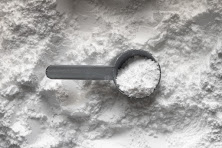The Science of Creatine
Extensive scientific and anecdotal accounts have confirmed
that creatine monohydrate indeed increased muscular size, strength and endurance
in those who use it regularly.
Creatine works in the body by increasing intramuscular stores of phosphocreatine and creatine, which increases protein synthesis (muscle building), prevents depletion of adenosine-triphosphate (APT) and helps reduce the breakdown of muscle tissue.
Additionally, supplemental creatine monohydrate causes a phenomenon called intracellular hydration, which means that cells at the muscular level become super-hydrated with water. This results in a noticeable and measurable increase in muscle size and girth.
Creatine monohydrate is sold in powder and capsule form, and it can be used in conjunction with other muscle building supplements such as whey protein powder.
The most cost-effective way to purchase creatine monohydrate is in flavorless, power form. Typically, 1-5 grams are taken daily, depending upon the desired result.
Some manufacturers recommend saturating the body with as much as twenty grams per day for the first week of creatine use.
The necessity of this “loading phase” has been disputed and it appears that simply ingesting three to five grams of creatine per day from the onset is just as effective in producing the desired effect.
Disregarding the likely unnecessary recommendation to front load creatine and simply taking the maintenance dose from the start will save you money and will not compromise your muscle building results.
How Creatine Works
Creatine works by providing the body with the compounds
necessary to develop ATP, an enzyme that allows muscles to explosively contract
and reduce recovery time.
By continuously supplying the body with creatine, the muscles can handle a greater workload for a longer period of time, resulting in greater muscular strength and endurance and ultimately larger, fuller muscles.
Those who use a quality creatine monohydrate powder supplement (affiliate link) will typically notice results within two weeks of starting its use. Bodyweight may rapidly increase, but keep in mind that the weight gain is that of intracellular water.
This occurrence is one of the primary reasons why muscles appear fuller and bigger in a short period of time.
Creatine is primarily stored within muscle tissue and is
also found in small quantities in the kidneys, liver, and brain. It should be noted that creatine can be
ingested by consuming animal-based foods, particularly beef.
For further understanding, creatine is an amino acid
derivative that is found in the skeletal muscle tissue of humans and
animals.
Very small quantities of creatine are synthesized within the human body, primarily by the kidneys, pancreas, and liver, however the majority of the creatine that exists within muscle cells is ingested through the consumption of meat and dietary supplements.
The supplementation of creatine, in the form of creatine monohydrate, results in enhanced availabilities of adenosine triphosphate (ATP) which is required for explosive, intense muscle fiber contraction.As stated previously, supersaturating muscle cells with creatine promotes a phenomenon called intracellular hydration, which facilitates the rapid absorption of water and nutrients into muscle cells, thus resulting in increased muscle size and thickness, and potentially reduced recovery time between intense workouts.
But consider that for a person to consume five grams of creatine, approximately one kilogram, or 2.2 pounds, of beef would have to be consumed. It is generally much easier and healthier to use a creatine supplement to achieve the desired dose.
Why Creatine May Be Worth Buying
Creatine monohydrate supplements are inexpensive and readily
available at most nutritional supplement retailers and online distributors such
as Amazon.
It should be emphasized that, unlike many other supplements
on the market, creatine monohydrate has been shown to increase athletic
performance and muscularity in its users with few negative side effects and has
been proven safe for long term use.
One of the most attractive qualities of regular use of creatine is the rapid appearance and development of full muscle bellies.
There is no shortage of nutritional supplement manufactures that produce an array of often overpriced muscle building supplements that claim to defy science and human genetics to provide their users with rapid, awe inspiring muscle growth.
However, the efficacy of most of these products is dubious at best, often leaving the user’s body unchanged and their wallet empty.
Scientific Evidence of Efficacy
Scientific research is abundant and anecdotal evidence
supports and proves the ergogenic and muscle building effects of creatine
supplementation:
William N. Taylor, M.D., reports that “creatine is associated with enhanced strength and muscle mass in strength-training programs. It is believed creatine use enables athletes to increase their workout quality and quantity, which, in turn, sends a stronger stimulus to the skeletal muscle cell’s genetic machinery.”
Life Extension Media published that “the most stable and cost-effective form sold today is creatine monohydrate. It is one of the few supplements available that has legitimate research studies backing its benefits.”
Life Extension Media published and cited sources stating that creatine is “associated with weight gain and improved nitrogen balance, and it has been shown to increase endurance, strength and stamina.”
Dr. Frederick D. Hatfield, Ph.D., published that “more creatine in the muscle seems to increase the amount of water taken into the cells; this will only increase the volume of the cell but seems to be involved in triggering an increase in protein/muscle production.”
Shopping for Creatine Supplements
While it can be concluded that creatine supplementation has been proven effective for muscle mass and strength gains, caution must be exercised when shopping for creatine supplements.
Consumers are advised to seek creatine monohydrate supplements that are “pharmaceutical grade,” meaning the ingredients are 99% pure with no additives or fillers.
Remember that nothing in nature is 100% pure, so supplement manufacturers that claim that their creatine product is 100% pure should be met with skepticism.
Although I’m not a registered dietician or professionally qualified to recommend nutritional supplements, I always recommend thorough and diligent research of supplements and manufactures so that consumers can make an educated decision on what supplements may be most appropriate for their goals and desired outcomes.
Often, the best resource for creatine related research is the supplement manufactures and distributors themselves.By visiting supplement and fitness-related websites, the consumer can gain a varied perspective and obtain vast information regarding the various creatine supplements available.
Many online retailers offer quality creatine supplements and can be a good resource for creatine research. Also, as with any other investment, when it comes to cost and price comparison, it pays to shop around.
Where to Get Your Creatine Monohydrate
You can get high quality, reasonably priced pharmaceutical grade creatine monohydrate here. If you make a purchase using the Amazon link I’ve provided, I may receive a small monetary commission.
Also Read
The Science of Building Big Arms: A How-To Guide
What Are Considered Big Forearms?
References
Smith SA, Montain SJ, Zientara GP, Fielding RA. Use of phosphocreatine kinetics to determine the influence of creatine on muscle mitochondrial respiration: an in vivo 31P-MRS study of oral creatine ingestion. J Appl Physiol. 2004 Jun;96(6):2288-92.
William N. Taylor, M.D. Anabolic Steroids and the Athlete, Second Edition. Published 2002 McFarland & Company, Inc., Publishers. pp 239-243.
Brose A, Parise G, Tarnopolsky MA. Creatine supplementation
enhances isometric strength and body composition improvements following
strength exercise training in older adults. J Gerontol A Biol Sci Med Sci. 2003
Jan;58(1):11-9.
Photo Credits
Cover photo by HowToGym on Unsplash
Pull Up photo by Edgar Chaparro on Unsplash
Amazon photo by Edgar Chaparro on Unsplash




No comments:
Post a Comment